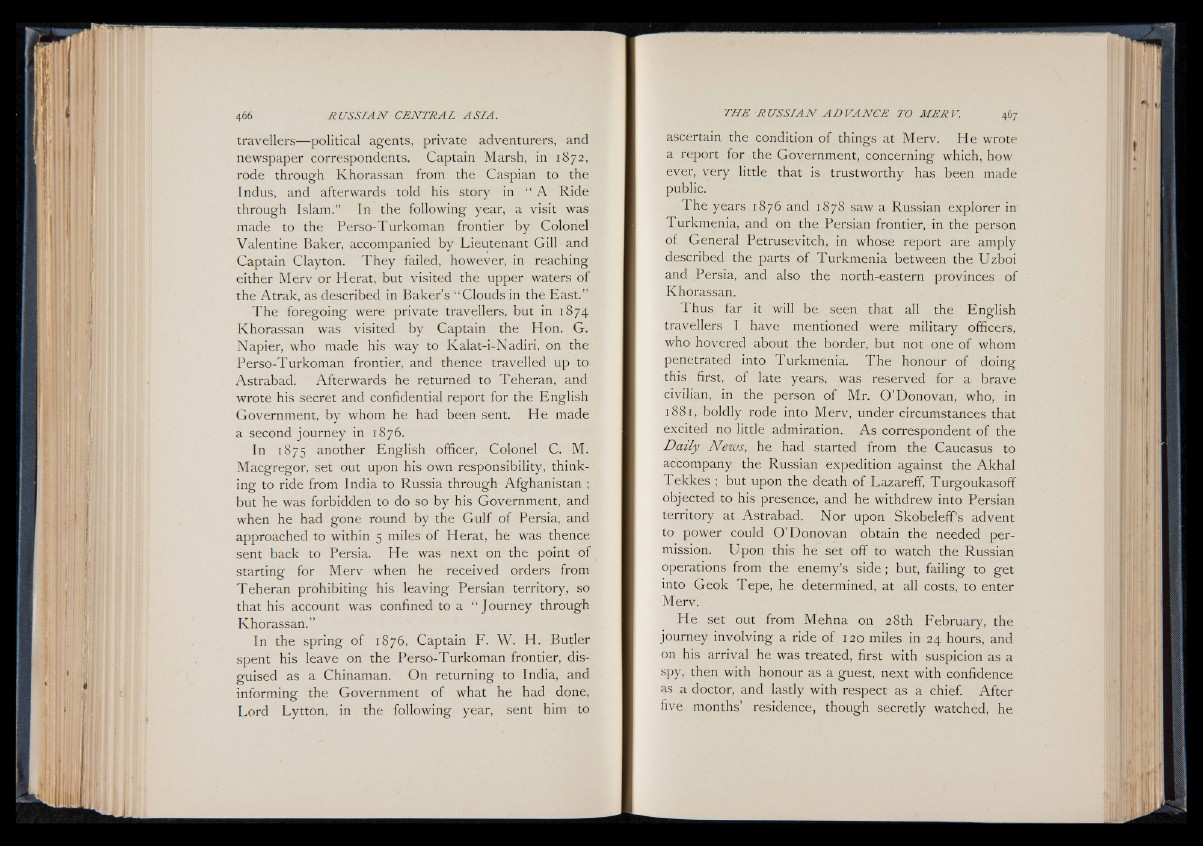
travellers— political agents, private adventurers, and
newspaper correspondents. Captain Marsh, in 1872,
rode through Khorassan from the Caspian to the
Indus, and afterwards told his story in “ A Ride
through Islam.” In the following year, a visit was
made to the Perso-Turkoman frontier by Colonel
Valentine Baker, accompanied by Lieutenant Gill and
Captain Clayton. They failed, however, in reaching
either Merv or Herat, but visited the upper waters of
the Atrak, as described in Baker’s “ Clouds in the East.”
The foregoing were private travellers, but in 1874
Khorassan was visited by Captain the Hon. G.
Napier, who made his way to Kalat-i-Nadiri, on the
Perso-Turkoman frontier, and thence travelled up to
Astrabad. Afterwards he returned to Teheran, and
wrote his secret and confidential report for the English
Government, by whom he had been sent. He made
a second journey in 1876.
In 1875 another English officer, Colonel C. M.
Macgregor, set out upon his own responsibility, thinking
to ride from India to Russia through Afghanistan ;
but he was forbidden to do so by his Government, and
when he had gone round by the Gulf of Persia, and
approached to within 5 miles of Herat, he was thence
sent back to Persia. He was next on the point of
starting for Merv when he received orders from
Teheran prohibiting his leaving Persian territory, so
that his account was confined to a “ Journey through
Khorassan.”
In the spring of 1876, Captain F. W. H. Butler
spent his leave on the Perso-Turkoman frontier, disguised
as a Chinaman. On returning to India, and
informing the Government of what he had done,
Lord Lytton, in the following year, sent him to
ascertain the condition of things at Merv. He wrote
a report for the Government, concerning which, how
ever, very little that is trustworthy has been made
public.
The years 1876 and 1878 saw a Russian explorer in
Turkmenia, and on the Persian frontier, in the person
of General Petrusevitch, in whose report are amply
described the parts of Turkmenia between the Uzboi
and Persia, and also the north-eastern provinces of
Khorassan.
Thus far it will be seen that all the English
travellers I have mentioned were military officers,
who hovered about the border, but not one of whom
penetrated into Turkmenia. The honour of doing
this first, of late years, was reserved for a brave
civilian, in the person of Mr. O ’Donovan, who, in
1881, boldly rode into Merv, under circumstances that
excited no little admiration. A s correspondent of the
Daily News, he had started from the Caucasus to
accompany the Russian expedition against the Akhal
Tekkes ; but upon the death of Lazareff, Turgoukasoff
objected to his presence, and he withdrew into Persian
territory at Astrabad. Nor upon Skobeleff’s advent
to power could O ’Donovan obtain the needed permission.
Upon this he set off to watch the Russian
operations from the enemy’s s id e ; but, failing to get
into Geok Tepe, he determined, at all costs, to enter
Merv.
He set out from Mehna on 28th February, the
journey involving a ride of 120 miles in 24 hours, and
on his arrival he was treated, first with suspicion as a
spy, then with honour as a guest, next with confidence
as a doctor, and lastly with respect as a chief. After
five months’ residence, though secretly watched, he